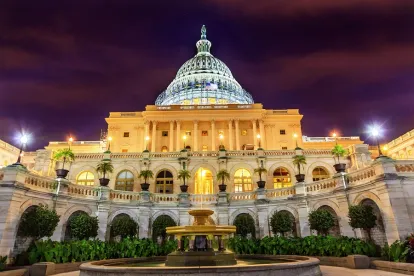Note: This client update is based on the stimulus bill passed by Congress and sent to the President for signature earlier this week. This bill is not law until the President signs the legislation, and recent news reports suggest that President Trump finds some portions of the stimulus bill objectionable. We will continue to monitor the status of this legislation and will report promptly when the bill is either signed into law or modified from its present form.
The Families First Coronavirus Response Act (FFCRA)—which requires certain employers with fewer than 500 employees to provide their employees with emergency paid sick leave (EPSL) and paid expanded family and medical leave (EFMLA) for specified reasons—is set to expire on December 31, 2020. Many employers have been watching closely to see whether Congress would act to extend the FFCRA into 2021.
On December 21, 2020, both the House and the Senate voted to pass a new $900 billion stimulus bill, sending it to the President’s desk for signature. Congress declined to extend mandated FFCRA leave, which ends on December 31st. However, the bill provides that after that date, covered private employers may claim the same tax credit associated with FFCRA leave that they voluntarily provide to their employees between January 1, 2021 and March 31, 2021. Thus, as of January 1st, FFCRA leave is no longer required, but if covered employers voluntarily provide paid leave through March 31st, they may take the tax credit for the leave. Although not eligible for the tax credits, public sector employers would be free to extend the leaves if they wish, or develop their own short term leave provisions for assistance to their employees in COVID-19 related circumstances.
Importantly, the language of the statute suggests that an employer would not be able to claim a tax credit if the employer provides leave after January 1st to an employee who already exhausted his or her 80-hour EPSL leave allotment or the $10,000 maximum paid entitlement for EFMLA in 2020. In other words, this tax credit extension in the new stimulus bill does not provide a new allotment of FFCRA leave to deal with COVID-19 related absences in 2021 if that leave was already taken in 2020. Of course, if an employer has an FMLA policy that is calculated on a calendar basis which resets on January 1st, the employee may be entitled to a new block of unpaid, job-protected FMLA leave for his or her own serious health condition or to care for a family member. The employer may elect to make that leave paid if it chooses, but the employer would not be entitled to a tax credit for doing so.
Employers should consider the implications of the expiration of mandated FFCRA leave:
-
Is “regular” FMLA applicable? For example, while mandated paid sick leave might expire on December 31st, employers with over 50 employees who are covered by the “regular” FMLA may still be required to provide up to 12 weeks of unpaid FMLA leave to eligible employees. This is due to the fact that employees who are being treated for COVID-19 or who are caring for a family member who is suffering from COVID-19 may qualify for FMLA leave for their own serious health condition or for a family member’s serious health condition, respectively. Employers who are required to provide leave under these circumstances may voluntarily pay the employee during that time and claim the appropriate tax credits.
-
If no “regular” FMLA required, what then? Smaller employers not covered by the FMLA—or larger employers with particular employees who are ineligible for FMLA leave (e.g., new-hires)—need to decide what they will do if and when their employees request leave. Will they offer paid leave under these circumstances and claim the tax credit?
-
What to do with employees who need leave to care for school-age children? Employers should also determine and communicate to their employees how they will handle issues presented if employees with school-age children face virtual and hybrid learning challenges. Will employers provide paid leave and claim the tax credit? Will they provide unpaid personal leaves of absence to these employees?
-
Are there state or local laws that may apply? Employers should always be cognizant of any paid sick leave or similar legislation at the state or local level where they operate.
Some employers might, for example, consider extending the emergency paid sick leave provisions but not the expanded family leave. Other employers might decide to fashion their own leave provisions or develop modifications to existing leave policies for a limited period of time. Part of the motivation for such provisions would be to avoid having employees return to work for fear of pay loss when they should be self-quarantined due to potential COVID-19 exposure.
Employers designing such benefits should clearly articulate whether they are expanding access to existing leaves (such as allowing use of restricted sick leave for quarantine or school closure purposes) or are offering a new pool of leave for COVID-19 related absences. An end date to the program should be stated, with no rollover provisions. Employers may wish to include a disclaimer that the employers “home-cooked” plan will be superseded by – and not in addition to – any new governmental plan that might be created in 2021.
As noted above, we will continue to monitor this legislation and any interpretive regulations and guidance that is provided by the Department of Labor.





 />i
/>i
